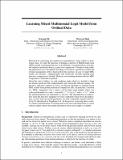| dc.contributor.author | Oh, Sewoong | |
| dc.contributor.author | Shah, Devavrat | |
| dc.date.accessioned | 2016-02-01T18:21:28Z | |
| dc.date.available | 2016-02-01T18:21:28Z | |
| dc.date.issued | 2014 | |
| dc.identifier.issn | 1049-5258 | |
| dc.identifier.uri | http://hdl.handle.net/1721.1/101039 | |
| dc.description.abstract | Motivated by generating personalized recommendations using ordinal (or preference) data, we study the question of learning a mixture of MultiNomial Logit (MNL) model, a parameterized class of distributions over permutations, from partial ordinal or preference data (e.g. pair-wise comparisons). Despite its long standing importance across disciplines including social choice, operations research and revenue management, little is known about this question. In case of single MNL models (no mixture), computationally and statistically tractable learning from pair-wise comparisons is feasible. However, even learning mixture of two MNL model is infeasible in general. Given this state of affairs, we seek conditions under which it is feasible to learn the mixture model in both computationally and statistically efficient manner. To that end, we present a sufficient condition as well as an efficient algorithm for learning mixed MNL models from partial preferences/comparisons data. In particular, a mixture of r MNL components over n objects can be learnt using samples whose size scales polynomially in n and r (concretely, n[superscript 3] r[superscript 3.5] log[superscript 4] n, with r << n[superscript 2/7] when the model parameters are sufficiently {\em incoherent}). The algorithm has two phases: first, learn the pair-wise marginals for each component using tensor decomposition; second, learn the model parameters for each component using RankCentrality introduced by Negahban et al. In the process of proving these results, we obtain a generalization of existing analysis for tensor decomposition to a more realistic regime where only partial information about each sample is available. | en_US |
| dc.language.iso | en_US | |
| dc.publisher | Neural Information Processing Systems Foundation | en_US |
| dc.relation.isversionof | https://papers.nips.cc/paper/5225-learning-mixed-multinomial-logit-model-from-ordinal-data | en_US |
| dc.rights | Article is made available in accordance with the publisher's policy and may be subject to US copyright law. Please refer to the publisher's site for terms of use. | en_US |
| dc.source | MIT web domain | en_US |
| dc.title | Learning Mixed Multinomial Logit Model from Ordinal Data | en_US |
| dc.type | Article | en_US |
| dc.identifier.citation | Oh, Sewoong, and Devavrat Shah. "Learning Mixed Multinomial Logit Model from Ordinal Data." Advances in Neural Information Processing Systems 27 (NIPS 2014). | en_US |
| dc.contributor.department | Massachusetts Institute of Technology. Department of Electrical Engineering and Computer Science | en_US |
| dc.contributor.mitauthor | Shah, Devavrat | en_US |
| dc.relation.journal | Advances in Neural Information Processing Systems (NIPS) | en_US |
| dc.eprint.version | Author's final manuscript | en_US |
| dc.type.uri | http://purl.org/eprint/type/ConferencePaper | en_US |
| eprint.status | http://purl.org/eprint/status/NonPeerReviewed | en_US |
| dspace.orderedauthors | Oh, Sewoong; Shah, Devavrat | en_US |
| dc.identifier.orcid | https://orcid.org/0000-0003-0737-3259 | |
| mit.license | PUBLISHER_POLICY | en_US |
